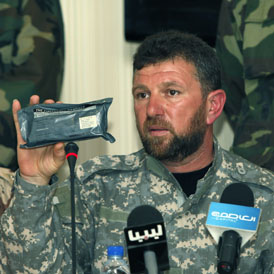‘Spy’ journalists reported killing of black Libyans
Two British journalists detained in Libya and accused of being spies were reporting on atrocities meted out against black people by the same forces that arrested them.

Nick Davies (who works under the name Nick Jones) and his cameraman Gareth Montgomery-Johnson had been working for Iran’s Press TV when they were arrested by the Misrata Brigade on 22 February.
Faraj al-Swehli (pictured), commander of the unit, said the men had entered Libya illegally and were carrying “incriminating evidence”, including video footage of what was alleged to show them test-firing weapons and also of carrying field dressing that he said are used by the Israeli military.
The pair had been reporting on an incident involving attacks against displaced black Libyans from Tawergha – a city that had previously been pro-Gaddafi – on 6 February at a detention camp in Janzour, a suburb of the capital of Tripoli.
The report, transmitted less than a fortnight before the journalists’ arrests, was highly critical of the National Transitional Council’s (NTC) protection of the detainees.
‘Damaging setback’
Jones interviewed a black Libyan who detailed the alleged murder of eight people inside the detention camp and fingered forces from Misrata for the attack.
“They came in around 20-30 cars full of guns… they wanted to come into the camp to conduct a general search,” the unnamed interviewee says.
“Everybody in the camp didn’t like the situation because Tawerghan teenagers have been taken before and have not been returned, or beaten.
“Today, eight people have been killed: an old man, one woman, one girl and three teenage boys.
“The cars would not leave the camp so people started to run away and the soldiers started firing on the crowd.
He added: “In my opinion, the cause of this is the Misratan rebels.”
The package ends with Jones saying that the alleged massacre “underscores a sense of lawlessness in the country… [it] could be a damaging setback to the country’s interim rulers.”
Human Rights Watch and Amnesty International have urged the group to hand over the reporters, calling the detention illegal.
UN’s ‘serious concern’
Jones and Montgomery-Johnson’s report came as the United Nations political mission for Libya, UNSMIL, told Libyan authorities it was seriously concerned about the deaths in Janzour.
It confirmed that a total of seven people were killed: three inside the prison, and four during a street demonstration by the Tawerghas following the shooting. YouTube footage taken outside the detention centre appears to verify this.
Last week, a UN Human Rights Council report said that Misrata militias had committed crimes against humanity of torture and killings of Tawerghas.
“The Misrata thuwar [anti-Gaddafi forces] have killed, arbitrarily arrested and tortured Tawerghas across Libya,” it said.
And in October, Human Rights Watch released a damning report on attacks on Tawerghas.
The town, near Misrata, was formerly home to about 40,000 people, but is now almost entirely deserted after it was devastated during the Libyan revolution.
Around 30,000 people settled in refugee camps in Benghazi and Janzour.
Former rebels believe that the town supported Gaddafi’s troops during the uprising.
In recent weeks, other videos have appeared on YouTube, purporting to show former rebels beating, torturing and humiliating black Libyans and itinerant workers.
A recently uploaded clip appears to show several black men in a cage, with green flags – a colour associated with Gaddafi – stuffed in their mouths. Men shout “Dogs, eat the flag. Eat it, you dirty Tawegha” before forcing the detainees to hop around the cell whilst their legs and arms are shackled.
Others show gangs of men whipping and beating black men unconscious.
In November, Channel 4 News spoke to Margaret, a Ghanaian national living with other west African nationals in squalid conditions on the outskirts of Tripoli.
Margaret, a housekeeper who has lived in Libya for more than 10 years, said that some of her friends had met terrible fates in the weeks since Tripoli fell to NTC rebels.
Some, she said, had been wrongly accused and detained by the rebels of being hired guns of Gaddafi. Others, passport-less and scared of suffering similar treatment, had tried and, tragically, failed to leave Libya by the only way they knew how: on the treacherous Medditeranean waters towards Malta or Italy.
Prisoner abuse 'widespread' under Libya's new rulers
-
Latest news
-
‘It was hard not to laugh on set’ – Swede Caroline lead on root vegetable mockumentary5m

-
Teachers to be allowed guns in Tennessee schools5m

-
Tory MP defects to Labour over NHS ‘chaos’2m

-
Al Sharpton on US campus wars and the US election race between ‘two old white men’5m

-
Israel-Gaza war continues to fuel protests and division in US, France and UK4m

-




